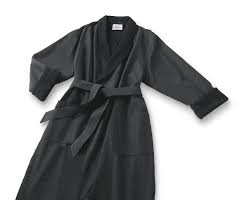robe
英 [rəʊb]
美 [roʊb]
- n. 长袍,礼服;制服
- vi. 穿长袍
- vt. 使穿长袍
- n. (Robe)人名;(德、罗、塞)罗贝;(英、法)罗布
使用频率:

记忆方法
1. rob => robe.
2. Presumably the notion is of garments taken from the enemy as spoils, and the Old French word had a secondary sense of "plunder, booty".
2. Presumably the notion is of garments taken from the enemy as spoils, and the Old French word had a secondary sense of "plunder, booty".
中文词源
robe 袍服,礼袍
词源同 rob,抢劫。代称,因过去衣服,特别是袍子是重要的战利品。
英语词源
- robe
-
robe: [13] A robe is etymologically ‘something stolen’, hence a ‘looted garment’, and finally simply a ‘(long) garment’. The word comes ultimately from Vulgar Latin *rauba, which was borrowed from the same Germanic base as produced English bereave and rob. It passed into English via Old French robe. This still retained the ancestral meaning ‘stolen things, spoils’ as well as the new ‘garment’, and in that sense it has given English rubbish and rubble.
=> rob - robe (n.)
- "long, loose outer garment," late 13c., from Old French robe "long, loose outer garment" (12c.), from a Germanic source (compare Old High German rouba "vestments"), from West Germanic *raubo "booty" (cognate with Old High German roub "robbery, breakage"), which also yielded rob (v.).
Presumably the notion is of garments taken from the enemy as spoils, and the Old French word had a secondary sense of "plunder, booty," while Germanic cognates had both senses; as in Old English reaf "plunder, booty, spoil; garment, armor, vestment." Meaning "dressing gown" is from 1854. Metonymic sense of "the legal profession" is attested from 1640s. - robe (v.)
- late 14c., from robe (n.). Related: Robed; robing.
权威例句
- 1. He brought forth a small gold amulet from beneath his robe.
- 他从袍子下面拿出一个不大的金护身符。
- 2. He helped her off with her robe.
- 他帮她脱去袍子。
- 3. The emperor was clad in a rich robe encrusted with jewels.
- 皇帝身穿一件镶满宝石的华贵礼袍.
- 4. She was wearing only a thin robe over a flimsy nightdress, and her feet were bare.
- 她只在薄如蝉翼的睡衣外套了一件薄睡袍,而且光着脚。
- 5. A soft white robe had been draped over a chair for Joanna's use.
- 一件柔软的白袍子搭在椅子上,供乔安娜使用。